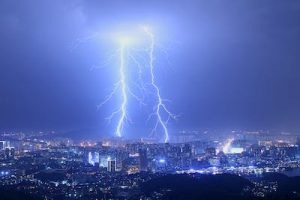Global Climate: Natural disasters are increasing the cost and availability of insurance
You can sign up for Globe Climate and all Globe newsletters here if you’re reading this on the web or if someone forwarded you this email newsletter.
Greetings and salutations, and welcome to Globe Climate, Canada’s newsletter on environment, resources, and climate change.
Earlier this year, The Globe conducted a survey among young Canadians on topics like gender, employment, and housing. Their responses betrayed a depressing lack of optimism for the future and the world in which they live. In interviews, they said that institutions and leaders betrayed them or neglected to give priority to long-term solutions to issues that would most directly impact them, like climate change. As a result, they expressed mistrust towards these parties.
“I’m scared of climate change and international conflict, but I’m scarier of people who don’t care about it,” 19-year-old university student Hannah Zilke said.
Young Canadians are worried about what lies ahead. However, beneath their existential anxiety is an astonishment: resiliency. Check out the entire narrative now: Gen Z puts it clearly.
Let’s catch you up on some more news now.
This week’s noteworthy reporting:
Rehabilitation: Wild + Pine and Aviva collaborate on an Albertan habitat restoration project
Analysis: Ottawa calls the bluff of industry with plans to cap emissions of oil and gas.
Cost of carbon: Canada suggests reducing emissions from the oil and gas sector by at least 20–23%, with industry funding the additional offsets. Additionally, Ottawa unveiled plans for a cap-and-trade system to reduce emissions of petrol and oil, although the goals were lowered.
more than anticipated
Real estate: Why in sustainable schools, zero represents success
Oil and gas: “A genuine seat at the table”: The rationale behind an Indigenous organization’s desire for a share of the TMX pipeline
Bugs: At the Great UBC Bug, students transform spooky crawlies into delicious treats. Cake Walk
A Closer Look at The Narwhal The focus of Canada’s most recent discussion on carbon pricing is farmers.
A closer look: Canadians are preparing for ongoing premium increases, and things will only get worse.
For The Globe, Clare O’Hara covers insurance and wealth management. She discusses home insurance and natural disasters in this week’s deeper dive.
When wildfires started to occur more frequently across Canada earlier this summer, we started to
I’ve heard that the cost of home insurance will increase. Major US insurers declared they would stop providing new home policies in states with high risk. We began to wonder if that could occur in Canada.
It has come to light that although Canadian insurers are dedicated to providing home insurance, only between 40 and 60 percent of Canadians have flood insurance as an add-on policy. Living in high-risk areas prevents 1.5 million homes, or 10% of all Canadians, from obtaining flood insurance.
I was taken aback when homeowners in Nova Scotia shared similar tales of not fully knowing what is and isn’t covered—until their claim was rejected.
Numerous people informed me that they had stated their desire for “maximum coverage” for all natural
catastrophes for their insurers. However, they were not informed that a claim’s approval is heavily influenced by the method in which water enters your house. For instance, during a storm, water may enter your home through the roof or a window, but it may also flood your basement if a river or brook overflows.
I found one interview with Saba Alam and one of his neighbours to be particularly noteworthy.
The majority of the houses on the street still had debris piles next to them when I met them outside of Alam’s house. Both of them talked about the horrifying night their basements were swiftly overrun by the storm. Alam’s wife and two kids fled with him, and the water was
the car was starting to fill with water, and he was knee-deep in the street.
Although both Alam and his neighbour had flood insurance, neither of them realised they had purchased houses in a flood plain. Alam had not yet received his payment when he started the reconstruction. Regretfully, the neighbor’s claim was turned down because the policy did not cover water that entered through the basement—only above-ground water. Like many other homeowners, he has hired an attorney because he believes that the language is unclear and that insurers should provide more education when marketing these kinds of products.
This week is COP28.
Views: The peaks and valleys thus far as the climate event enters its last, frantic days
The yearly UN climate conferences are usually low on breakthroughs and high on drama until they start to go overtime at the end of the second week. The start of the COP28 climate conference in Dubai on November 30 did not see many deviations from the well-known script, but that does not mean there were not any memorable moments—some questionable, some deserving of polite applause. Here is a list of Eric Regulus’s current highs and lows.
- Conflicts over fossil fuel phase-out at COP 28 follow OPEC’s rebuff
- The COP 28 climate talks are currently in a hazy state of hope with obstacles after a quick start.
- As executives from fossil fuel companies swarm the UN climate summit, some wonder, “What are COP s about?”
- During the COP 28 climate summit, activists stage a rare political protest in the UAE.
- Participants in negotiations at As the clock runs out on climate talks, COP 28 is urged to focus narrowly in order to reach an agreement on how to save Earth.
- Predicted to host the COP 29 climate talks is Azerbaijan
What more did you overlook?
Province and federal governments reject a $1.5 million proposal to resume oil exploration off the coast of Nova Scotia.
“That mountain is shaking”: An unprecedented evaluation takes into account Indigenous narratives Due to “misleading” environmental claims, Britain has banned certain airline advertisements.
Methane emissions from Saskatchewan are overestimated, and releases occur at a high rate: study
At the climate meeting, environmentalists bestow the satirical Fossil of the Day award on Alberta.
Views and evaluations
Babushka Konrad: Leading the way in the new era of nuclear power is Canada
Marvin Shaffer, John Richards, and Curtis Eaton: The carbon tax’s proceeds ought to go towards paying for adaptation strategies
Gary Mason: The carbon tax is an uncomfortable truth more beneficial than harmful
The editorial board: The beginning of a success story in climate change
Jessica Scott-Reid: The newest tactic used to keep animals in captivity is called “conservation washing,” so beware of its rise.
Corporate Citizen of the Year, ROB Magazine:
You should be aware of two aspects of Connors Passkey’s investment philosophies regarding the climate transition.
His first rule is that, just because Brook field’s decolonisation goals may benefit the environment, he will not accept a discount on investment returns.
Secondly, Brook field occasionally spends a lot of money on heavy emitters in an effort to begin the process of turning a new leaf.
View the entire narrative: In addition to advancing the energy transition, Testes is profitable.
- Darren Woods, CEO of Exxon Mobil, sets ambitious schedule with limited time
- Markets: Do sustainable ETFs have lost their lustre?
- Further Investors motivated by ESG factors might be reevaluating defence firms in light of democratic threats.
Directions and Explicitness:
- Learn how to make sustainable investments. For investors who are concerned about the environment, we offer a course called Green Investing 101 newsletter course. Not sure if you require assistance? Test your knowledge by taking our quiz.
- For your convenience, we’ve compiled the content from our reporters to explain what a carbon tax is and how climate change will generally affect Canada.
- We’ve got tips on how to travel more sustainably, and these books will nurture your inner environmentalist. You can also download Micro Skills – Little Steps to Big Change as an e-book.
Learn about the global climate:
- The youth desire a place at the COP 28 table.
- New methane regulations and funding will be announced by Ottawa before COP 28.
- Studies demonstrate that Canada’s climate commitments depend on its forests.
- Canada also lost out on funding the vital minerals revolution.
- READ MORE:
1. Health and Fitness Tips for You
2. Upcoming New Movies
3. Get New Jobs Directly From Companies FREE Visa
4.Latest News of Cryptocurrency and Bitcoin
5. Real Estate Business for you
6. Latest News
7. Best Insurance Policy for Everyone
READ MORE:
- 1. Strategic Management Process: Top5 Jobs In Dubai FREE VISA Apply Now
- 2. Vancouver Time fighting for $12,000 in travel insurance Nightmare FREE
- 3. DIABETIC DIET : A PROFESSIONAL’S GUIDE TO A WARM AND WELL-BEING
- 4. NICOLAS CAGE STATES : HE HAS 3 OR 4 MORE MOVIES LEFT NOW
- 5. EMPRESS CRACKS: FOR THE FIRST TIME SINCE APRIL
- 6. DESPITE MEANING: DESPITE HIGH RATES, MORE US HOME BUYERS ARE WILLING TO BUY
- 7. A 44-YEAR-OLD BOSTON WOMAN WAS KILLED BY A SHARK ATTACK IN THE BAHAMAS WHILE ON VACATION



